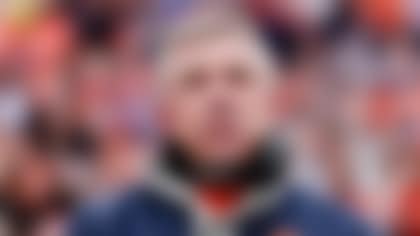In the autumn of 1989, Paul Tagliabue became the NFL's seventh full-time commissioner.
He was voted to succeed Pete Rozelle, and after 17 years was followed by Roger Goodell.
In between, Tagliabue navigated the NFL through the expansion from 28 to 32 teams, six divisions to eight, grew the game globally, achieved labor piece, established the league's own website and TV network, and navigated it through the tragedies of Hurricane Katrina and 9/11.
Once the league's attorney, Tagliabue left an undeniable mark overseeing the NFL and became the fifth chief executive of the league elected to the Pro Football Hall of Fame. He died Sunday at the age of 84, the league announced.
"All of us in the NFL are deeply saddened by the passing of Paul Tagliabue, whose principled leadership and vision put the NFL on the path to unparalleled success," Goodell said in statement on Tagliabue's passing.
"Throughout his decades-long leadership on behalf of the NFL, first as outside counsel and then during a powerful 17-year tenure as commissioner, Paul served with integrity, passion and an unwavering conviction to do what was best for the league. Paul was the ultimate steward of the game -- tall in stature, humble in presence and decisive in his loyalty to the NFL.
"He viewed every challenge and opportunity through the lens of what was best for the greater good, a principle he inherited from Pete Rozelle and passed on to me. ... I am forever grateful and proud to have Paul as my friend and mentor. I cherished the innumerable hours we spent together where he helped shape me as an executive but also as a man, husband and father. Jane and I extend our heartfelt condolences to entire Tagliabue family, especially Chan, his wife of 60 years, and their children Drew and Emily."
Tagliabue served the league as commissioner from 1989 through his retirement in September of 2006.
As his predecessor Rozelle guided the NFL into and through the Super Bowl era and television age, Tagliabue took the league baton and sprinted forward.
During Tagliabue's time as commish, free agency and the salary cap were instituted. The aftermath saw increased parity in the league, with NFL seasons frequently offering worst-to-first stories and aiding in the league's growth as fans of every team began to expect quicker reversals of fortune.
"For decades, the NFL has served to unite people from all over America," Tagliabue said in his Hall of Fame enshrinement speech on Aug. 7, 2021. "You can see that here tonight. You can see it every weekend for more than 20 weeks a year. The league has served to unite people, irrespective of class, creed, color and attributes. The league has served as a focal point of shared community interests and civic pride for millions of people.
"But these qualities and outcomes cannot be taken for granted. It's up to us to make sure that they continue. The NFL in the 21st century is not going to be the NFL that it was in the 20th century. It's going to continue to evolve as our society evolves. But we need to remain committed both to evolution, to change and to tradition.
"I'm proud and grateful that I've played a small part in shaping the evolution of the National Football League in the last four decades."
Tagliabue was a New Jersey native, born on Nov. 24, 1940, in Jersey City.
A standout on the St. Michael's High basketball team, he earned an athletic scholarship to Georgetown University. He graduated in 1962 as a Rhodes Scholar finalist and a member of the dean's list.
It was during his time at Georgetown that Tagliabue inadvertently played in a fixed game, which he revealed during a congressional hearing in 1992. It was an event that shaped his stance on confining state-sponsored sports gambling to Nevada and a select few other states.
Following his Georgetown days, Tagliabue graduated from New York University School of Law in 1965 and would go on to receive honorary degrees from Colgate and Northeastern.
For two decades, Tagliabue practiced law at the Covington & Burling firm, where he also became the NFL's attorney.
Rozelle, who served as the NFL commissioner for nearly 30 years, announced his retirement in March of 1989.
On Oct. 26, 1989, Tagliabue was elected as Rozelle's successor, becoming the seventh chief executive of the NFL and beginning what would be a 17-year term as commissioner. It was hardly an easy process, though. It wasn't until after three owners' meetings and much debate that Tagliabue was chosen in a tight race over New Orleans Saints vice president and general manager Jim Finks. As fate would have it, Tagliabue would be connected to the Saints on more than one monumental occasion ahead.
Tagliabue quickly made a massive impact, with the 1990 owners meetings standing as a landmark engagement. Tagliabue and broadcast committee chairman Art Modell announced a four-year, $3.6 billion TV deal that was a record amount at the time. At the same meeting, Tagliabue announced a committee on expansion and realignment. It led to the 1995 additions of the Carolina Panthers and Jacksonville Jaguars.
Following the milestone owners' meetings of 1990 that led to a revenue windfall and league expansion, Tagliabue and team owners launched the World League of American Football. The league would later become NFL Europe. Though it was eventually shuttered, it established an NFL presence in Germany, Spain and the United Kingdom. As the NFL has reached new heights globally, international games have been hosted or will be in each of those locales.
The impact of Tagliabue's early years at the helm continued in 1993. Beneath the Tagliabue umbrella, the league and NFL Players Association reached a collective bargaining agreement in 1993. It was extended in 1998 and again in 2002 through the 2006 season. As Tagliabue took over in 1989, he took the reins of a league that had weathered two labor strikes (1982, 1987) during the 80s, but his tenure was one marked by labor harmony.
During Tagliabue's stewardship, the league also supported the construction of 20 new stadiums.
While two new franchises were welcomed into the NFL during Tagliabue's time, two others left their longtime host cities and further altered the league landscape. The Cleveland Browns, owned by Modell, left The Land and became the Baltimore Ravens in 1996. A year later, the Houston Oilers became the Tennessee Oilers and eventually, in 1999, the Tennessee Titans.
In 1999, the Browns returned to Cleveland as an expansion team. In 2002, another expansion squad debuted in the form of the Houston Texans.
It was in 2001 that Tagliabue was called on to shepherd the league through harrowing times felt all over the nation. In the wake of the Sept. 11, 2001, terrorist attacks -- four coordinated suicide plane hijackings that resulted in the destruction of the World Trade Center's Twin Towers, a crash into the Pentagon and another into a Pennsylvania field following a passenger rebellion -- Tagliabue announced the postponement of the full slate of Week 2 games.
The attacks were on a Tuesday and the games were postponed by Thursday.
In between, Tagliabue agonized over the decision, speaking with owners and considering the history of how the NFL and other sports leagues had handled the Pearl Harbor attack in 1941 and the assassination of President John F. Kennedy in 1963.
"The substance of the discussion was, are we caving into terrorists in a way that reflects weakness and gives them a victory, or are we doing the right thing and taking time to heal?" Tagliabue told NFL senior national columnist Judy Battista in 2021.
It didn't take long for Tagliabue to come to a decision he called a "no-brainer."
"Once I was able to think that clearly, I said, 'We ain't playing,'" Tagliabue said.
It was the first time the NFL had cancelled a full week of games since the 1987 strike. The games would be played, though, as they were moved to the end of the season. Thereby, Super Bowl XXXVI -- a 20-17 win for the New England Patriots over the St. Louis Rams -- became the first championship game played in February.
It was at the dawn of a new century in which Tagliabue's importance to the league and the sports world at large drew perhaps its largest recognition.
He was named 2000 Sports Industrialist of the Year by The Sports Business Daily, 2001 Sports Executive of the Year and the 2001 Most Powerful Person in Sports by The Sporting News.
Unfortunately, four years after 9/11, Tagliabue was again called on to shepherd the league through a catastrophic tragedy.
Hurricane Katrina ravaged New Orleans and surrounding areas in late August 2005, causing nearly 1,400 deaths, damage estimated at more than $120 billion and the flooding of roughly 80% of the city.
In the aftermath, Tagliabue played a pivotal role in ensuring that the Saints would remain in New Orleans and worked with Gov. Kathleen Blanco and the Superdome to make certain the team's home stadium would be repaired in time for the 2006 campaign.
"In terms of community and something that has an enormous impact on the fans, I think [keeping the Saints in New Orleans has] gotta be ranked No. 1," Tagliabue told ESPN in 2015.
Following Hurricane Katrina, the 2005 season opened for the Saints with a "home game" against the New York Giants at Giants Stadium. Thereafter, the Saints' home games were hosted at LSU in Baton Rouge, Louisiana, and the Alamodome in San Antonio, Texas, where the team's offices were headquartered.
Though denied by Saints ownership, reports and rumors swirled that the franchise would make its way to San Antonio permanently. Tagliabue wanted the Saints to stay put, though, and on Jan. 11, 2006, he announced the team would play all eight of its home games at the Superdome, which would reopen on Sept. 24, with New Orleans hosting the archival Atlanta Falcons. In dominant fashion, the Saints prevailed to start the season 3-0, turning in an uplifting 10-6 campaign and advancing to the NFC Championship Game. It was the first season in New Orleans for head coach Sean Payton and quarterback Drew Brees and the first time the franchise had made it to an NFC title game. Three seasons later, the Saints won the Super Bowl.
"If you wrote the story for a movie, people would say it's hyperbole and exaggeration," Tagliabue told ESPN.
Though no longer the commissioner, Tagliabue played a major role in another chapter of Saints history in 2012. Goodell called up Tagliabue to hear the appeals of Saints players suspended in "Bountygate," a program in which New Orleans players allegedly collected bounties for injuring opposing players. It resulted in suspensions for Payton and defensive coordinator Gregg Williams. Tagliabue affirmed Goodell's findings in the investigation, but overturned every suspension handed out to Saints players.
Roughly six years prior to Goodell calling on him, Tagliabue ended his time as commissioner.
Tagliabue worked out a league TV deal and a long-term pact with NFL players in the spring of 2005 and promptly announced he would be retiring a year later.
"As difficult as this decision is, I also know it's the right decision. Right for me. Right for the league," he said.
Akin to a player leaving after a Super Bowl win, Tagliabue left the NFL on a high, having worked out deals to set the league up for future prosperity and having set up the future commissioner -- Goodell -- to hit the ground running.
Tagliabue was voted into the Pro Football Hall of Fame in 2020, following previous commissioners Bert Bell and Pete Rozelle, and former league presidents Jim Thorpe and Joe Carr, to enshrinement.
Though recognized as part of the Centennial Class of 2020, Tagliabue didn't take his spot in Canton until the summer of 2021.
"It's like a dream come true, I'll tell you that," he said in his enshrinement speech. "Thank you all very, very much. I'm honored to enter the Hall of Fame in this Centennial Class. It spans pro football history, from Duke Slater's achievements in the difficult days of the NFL's first generation, to players, coaches and others who have excelled in recent decades."
For nearly two decades, Tagliabue piloted the NFL ship.
He steered the league, its owners and players into labor peace and television prosperity; he drove expansion and global growth; and perhaps most memorably captained the NFL through the heartbreak of 9/11 and Hurricane Katrina.
Studious in his spectacled presence, ever offering the most professional demeanor, Tagliabue will forever remain one of the gridiron's greatest gamechangers.












